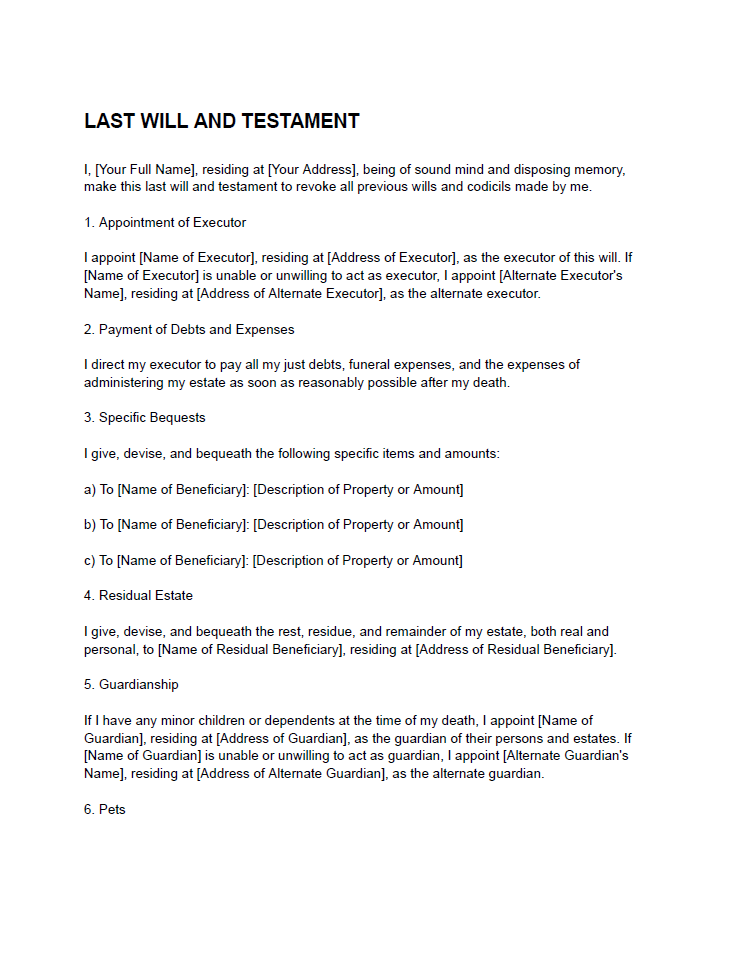What Is a Living Will?
A living will is a document that clearly outlines a person's preferences for medical treatment in scenarios where they are no longer able to communicate their decisions.
It is considered a form of advance directive, legally empowering healthcare providers to follow the patient's instructions during critical and end-of-life care situations.
Key Elements of a Living Will Include:
- Medical Treatment Preferences: It enumerates the types of medical care the individual does or does not want, such as life support, resuscitation, or tube feeding.
- End-of-Life Wishes: The document may specify wishes regarding palliative care, organ donation, and preferences for dying at home versus in a hospital.
Accessibility of Living Will Templates:
Living will templates are widely accessible in various formats to assist individuals in creating their document.
- A Living Will Form - PDF: This is a digital format that allows easy distribution and printing.
- Living Will Template PDF: Often used for guidance, it helps outline the structure and content of a living will.
- Living Will Forms Free Printable: Many organizations provide free templates that an individual can print and complete.
When creating a living will, it is important to ensure that it complies with state laws, as requirements can vary.
A complete living will form should be signed, and, depending on the jurisdiction, it might also require notarization or witnesses.
It's advisable for individuals to consult with a healthcare professional or an attorney to ensure that the living will fully encapsulates their wishes and is legally sound.
How to Make a Living Will
Creating a living will is a proactive measure to ensure one's healthcare preferences are respected in situations where they cannot communicate their wishes due to medical incapacitation.
The following steps outline the process of writing a living will:
- Reflect on Preferences: Consider the types of medical treatment desired in cases of terminal illness, serious injury, coma, advanced dementia, or near-death situations.
- Select a Form: Look for a free printable living will template or a living will template free of charge.
Forms can vary by state, so ensure the template complies with local laws.
Free living will forms to print are available online, or one might use a living will template Microsoft Word for easier editing. - Complete the Form: Fill in the blank living will form, specifying preferences for medical procedures such as life-sustaining treatment, resuscitation, and artificial nutrition or hydration.
Consider palliative care options and instructions for organ donation, if desired. - Legal Requirements: A living will must align with state laws to be valid. This can include witness signatures or notarization.
Check the specific requirements, such as using a free online living will service that considers state-specific guidelines. - Share and Store: After notarization, copies should be given to a trusted physician, healthcare proxy, and loved ones.
Keep the original in a safe location where it can be accessed if needed.
By using a free living will template or other free printable living will forms, the creation of a living will can be straightforward and cost-effective.
It's crucial to update the document regularly to reflect any changes in choices or life circumstances.
What Happens if You Don't Have a Living Will?
In the absence of a living will, decisions about an individual's healthcare may fall to family members or the healthcare providers.
Family members might be asked to make choices on behalf of the patient, but without written directives, disagreements can occur, leading to potential delays in treatment and emotional distress.
If no family is available or if there is uncertainty among family members, healthcare providers may proceed based on their professional judgment and established protocols.
This could result in actions that might not align with what the individual would have preferred.
The attending physician generally assumes the role of the decision-maker, drawing upon their expertise and understanding of the medical situation.
Without a living will, the courts may need to appoint a guardian or conservator to make decisions for the incapacitated individual.
This process can be lengthy, costly, and emotionally taxing for all parties involved.
It's also important to note that the lack of a living will does not affect one's last will and testament, which deals with the disposition of property after death, not the healthcare decisions made while the person is still alive.









